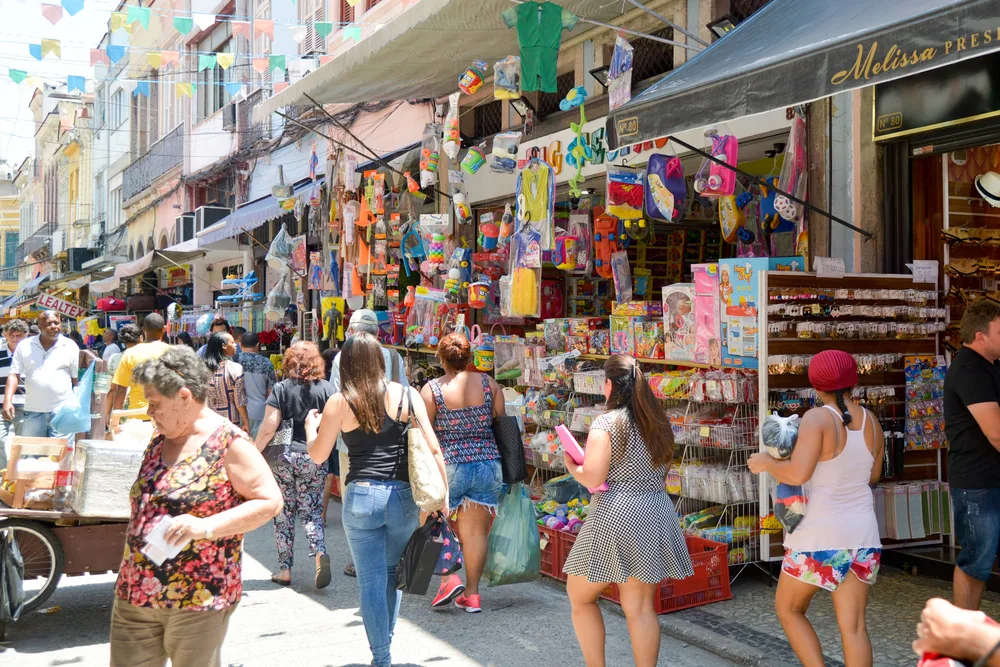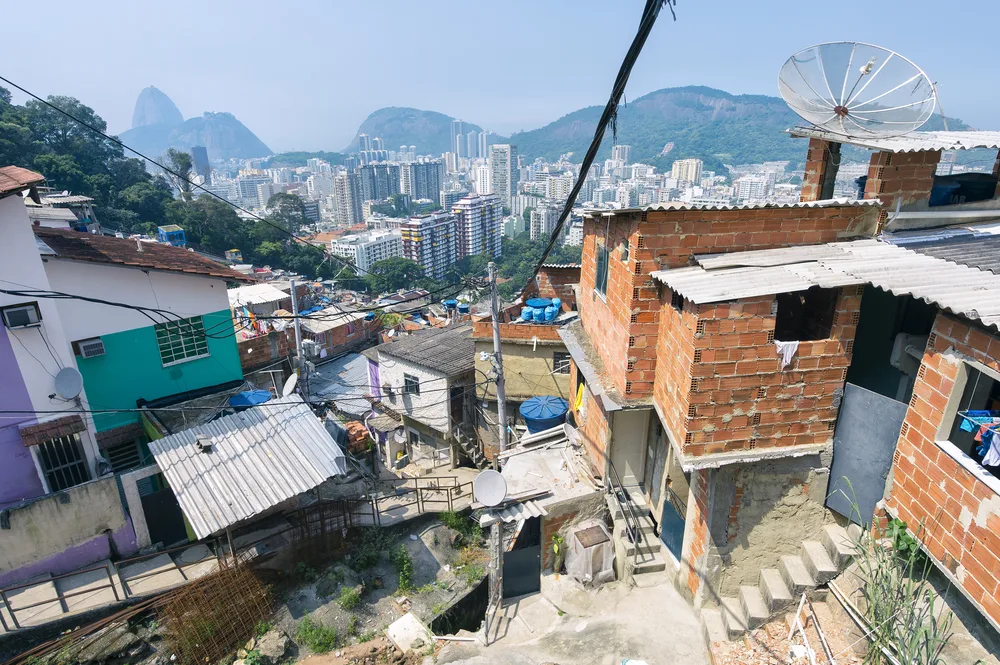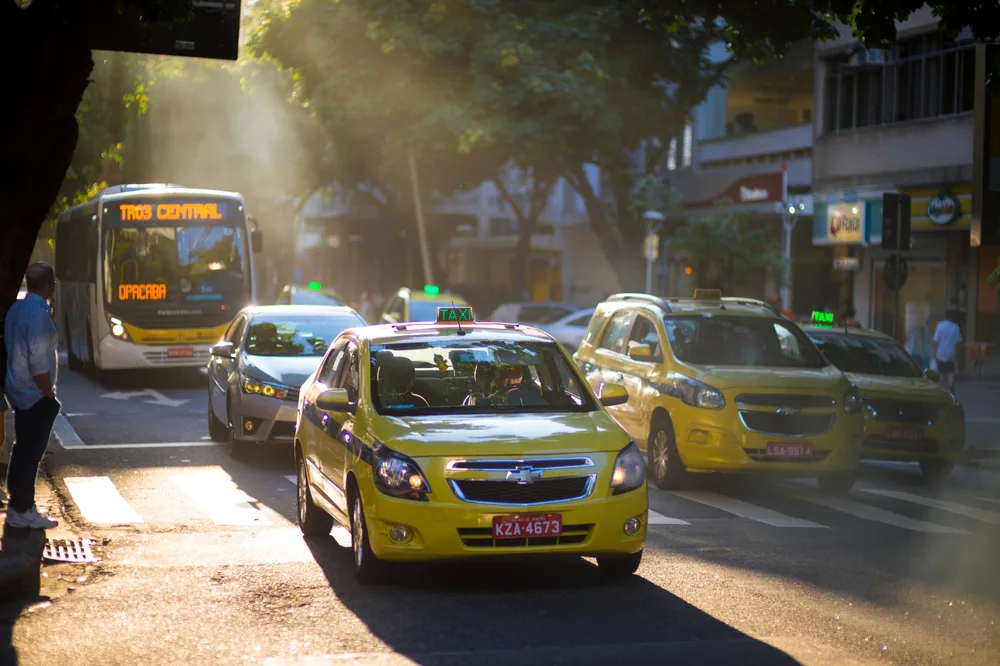Is Rio safe to visit in 2026?
Rio de Janeiro has a reputation for high crime rates, including violent crime, but most incidents affecting tourists are related to petty theft like pickpocketing. Visitors can enhance their safety by taking precautions such as not flashing valuables, avoiding poorly lit areas at night, and not venturing into favelas (impoverished neighborhoods).
Beautiful Rio de Janeiro is a city that captures the imagination. There are so many songs about how beautiful it is, from “Copacabana” to “Girl from Ipanema.”
It’s home to several wonders of the world, including the massive Christ the Redeemer statue and the Harbor of Rio de Janeiro. Venture into the city, and there is so much to do. Lie on the beautiful sandy beaches or explore the vibrant city.
If you come during the world-famous Carnival festival, you’re in for an even bigger treat as the streets come alive with samba music. A trip here sounds perfect, whether you enjoy lazing on the beach or taking a more active vacation. But is Rio safe to visit? Here’s our take.
Is Rio Safe to Visit in 2026?

Vitormarigo/Shutterstock
Yes and no. Rio is not the safest city to visit. It has high levels of crime, including violent crime. Tourists are often targets for robbers and pickpockets.
However, you can avoid most trouble in Rio by taking a few precautions and avoiding bad areas. Most governments, when issuing travel advisories for Brazil, emphasize the danger of crime.
The Canadian government tells its citizens to exercise a high degree of caution, especially in Rio de Janeiro and other big cities.
The United States also tells its citizens to exercise a high degree of caution and not to venture into informal housing developments such as favelas in big cities, including Rio de Janeiro.
The warnings are accurate to some extent. Rio de Janeiro does have a very high crime rate. For example, in 2021, the city experienced 4,653 shootings, many of which had fatalities.
Remember that Rio de Janeiro is a very unequal city. A recent presentation showed that Rio de Janeiro is unequal according to many measures.
It makes sense since it is located in Brazil, a country with the second-highest rate of concentrated wealth in the world. Some people in Rio de Janeiro are living in lavish mansions, while many others are crammed into informal settlements called favelas with no resources.
The result is prime conditions for a high crime rate. The stratified landscape of Rio de Janeiro does mean that crime varies significantly by neighborhood.
Most violent crime is confined to the favelas or certain more dangerous areas of Rio de Janeiro, which is awful for residents of these neighborhoods but doesn’t affect foreigners much.
Foreigners are usually victims of crimes of opportunity, such as pickpocketing and theft, which are definitely unpleasant but not as dangerous. Besides crime, there are a few other things to keep in mind when visiting Rio if you are concerned about your safety.
Rio de Janeiro experiences some natural disasters, especially during the wet season when flooding and natural disasters can happen. Insect-borne diseases and riptides along the beach are also common.
Visitors in 2023 might want to exercise caution due to the risk of political unrest. On January 8th, 2023, supporters of former far-right president Jair Bolsonaro, who believe he did not truly lose reelection to Lula, stormed the capital in Brasilia and held protests across the country.
While the government responded swiftly by arresting many of the ringleaders and most of the unrest happened in Brasilia, the capital, protests can happen in Rio, so be careful if you run into chanting crowds.
To recap, the main concerns for visitors to Rio de Janeiro include:
- Pickpocketing
- Bag snatching
- Mugging
- Assault
- Violent crime
- Civil unrest
- Natural disasters
That being said, as long as you keep basic safety precautions in mind, you will probably have a good time in Rio de Janeiro. After all, about 1.5 million people visit annually and have a great time.
Ready to Book?
Unlock Exclusive Discounts on Expedia.com!
Got Travel Insurance?
Protect yourself for unexpected interruptions.
Compare Plans We may be compensated when you book after clicking on one of our links.Crime in Rio

Rio de Janeiro, Brazil – september 09, 2017: Street of the “Saara” region, popular street shopping place in the city/Celso Pupo/Shutterstock
The primary concern tourists have when visiting Rio de Janeiro is crime. The city has a notoriously high crime rate. Worryingly so, a big chunk of that crime rate is violent crime.
Locals and ex-pats share concerns about crime, so it’s clearly not just tourists being nervous about visiting a new place. In a survey of Rio de Janeiro residents, the site Numbeo found that 96.40% thought that the crime rate in the city was high.
It also reported that 86.83% of people worried about being mugged or robbed, while 90.59% worried about violent crimes such as assault and armed robbery. The perception of Rio is backed up by the numbers.
Unfortunately, the homicide rate is 39 incidents per 100,000 people as of 2019. Such an alarming number deserves more context. Most homicides and incidents of gun violence in Rio occur in favelas, or informal neighborhoods where Rio’s most impoverished residents live.
Favelas have high levels of gang violence and organized crime, and many of the city’s homicides occur in gang shootouts, where bullets also affect innocent bystanders.
Sadly, a high proportion of the homicide rate in favelas also occurs due to police violence. Police raids sometimes kill dozens of people at a time.
Keep in mind that in Rio de Janeiro, as in the rest of Brazil, the homicide rate is steadily falling, so the city has good news ahead of it. The primary crime tourists need to worry about is theft.
While violent crime is geographically confined to a few areas of Rio de Janeiro, theft can happen anywhere. Petty theft is more common in well-trafficked parts of Rio as that is where wealthy tourists, the perfect victims, are.
Pickpocketing
The crime tourists are most likely to encounter in Rio de Janeiro is petty theft, such as pickpocketing and bag snatching. These are usually crimes of opportunity, not violent crimes.
Criminals notice distracted tourists and realize they can hit paydirt. There are a few types of theft you need to watch out for while in Rio. There’s the standard pickpocketing and bag snatching.
There are also arrastoes, or flash mob robberies, where groups of robbers, usually young people, swarm a popular tourist destination, rob everyone found there, and disappear within a few minutes. These flash mob robberies often happen on Rio de Janeiro’s beaches.
Scams targeting tourists are also common. There are technological forms of scams, such as credit card fraud and ATM skimming.
You will also encounter common tourist scams, such as people offering to help you with directions, spilling something on you and then offering to help you clean it up, or otherwise distracting you so an accomplice can rob you.
If you notice someone paying too much attention to you, get away from the area and try to ignore them. Pickpocketing and petty theft are common throughout Rio de Janeiro, particularly in neighborhoods that get a lot of tourists.
Watch out in the Centro or even on the beach. Incidents of crime are even greater during festivals such as Carnival or New Year’s, thanks to the crowds. There are a few things you can do to minimize your risk of being a victim of a crime.
Never flash your valuables, including your phone and expensive cameras. When you leave your accommodation, only take one card, enough cash for the day, and a copy of your ID instead of the real deal.
Try to blend in with your surroundings — don’t wear flashy designer clothing, but also don’t wear your swim trunks into town. You’ll notice that most Rio residents take care in how they dress, so dressing ultra-casual makes you stick out.
Armed Robbery
Many tourists worry specifically about the violent crime rate when coming to Rio de Janeiro—losing some dollars is fine, but losing your life is a different matter.
While tourists rarely experience the most violent crimes that occur in Rio, they are sometimes targeted for armed robbery and assault. Armed robberies and hold-ups sometimes happen in Rio de Janeiro.
Another form of armed robbery is an “express kidnapping,” which the Canadian government describes in its advice for tourists. There, victims are taken off the street and forced to withdraw all their money from an ATM to give to the robber, and only released after the bank account is empty.
Most armed robberies occur at night in Rio de Janeiro (although there are a few incidents during the day). You’ll notice that local drivers and taxicabs rarely stop for red lights when driving at night.
That is due to the fear of roadblocks and robbers waiting at traffic lights. Robberies also occur on city buses and down side streets. Since most robberies occur at night, taking precautions when traveling at night can help protect you.
Never travel alone at night but always in a group. Stick to well-lit main streets even when in a group.
Take an Uber, 99Taxi, or radio taxi, and never walk or hail a taxi from the street. If someone does mug you, hand over your valuables, and don’t try to fight back. Your life is the most valuable thing you own, after all.
Avoiding Bad Areas

Lazyllama/Shutterstock
Since crime in Rio varies so much from neighborhood to neighborhood, it makes sense that knowing which areas to avoid is crucial when it comes to staying safe. Most crime happens in the impoverished neighborhoods known as favelas, so avoid venturing into them.
The most notorious ones are located in the west and north of the city. Some big favelas are Vila Cruzeiro and Complexo do Alemão. Some guides offer favela tours, but remember they can’t guarantee your safety.
Pickpockets and petty criminals operate most often in Rio’s popular tourist areas, such as Copacabana, Centro, and Lapa. The beach also attracts a lot of criminals.
Avoid walking on the beach at night, especially on the north end of the beach. If you’re visiting the Christ the Redeemer statue, take the cog train, van, or taxi. The hiking trail has had a few mugging incidents in the past.
Frequently Asked Questions

RIO DE JANEIRO – MARCH, 2018: Traffic clogs the streets of the leafy upscale neighborhood of Ipanema, whose wealthy residents are in a constant battle for quality of life/Lazyllama/Shutterstock
Learn more about Rio by checking out the answers to these questions:
Is is safe to walk at night in Rio?
You should take precautions if you are walking at night in Rio, such as walking with a group and sticking to well-trafficked, well-lit areas. Crime does happen, but you should still take advantage of the city’s nightlife.
How do you avoid crime in Rio?
Most crimes affecting tourists in Rio are crimes of opportunity, so make sure you don’t look like a good opportunity by not wearing flashy jewelry, keeping valuables out in the open, or drawing attention to yourself. That being said, you can never avoid crime completely, and sometimes you just have bad luck.
What neighborhoods should you avoid in Rio de Janeiro?
Try to avoid more dangerous neighborhoods such as Rocinha, Vila Mimosa, and Bangu. Avoid the favelas, especially those in the north and west.
Is Rio worth visiting?
Even though you have to keep your wits about you, Rio is absolutely worth visiting. The city has beautiful views and nature, amazing beaches, and a lively culture.
Are taxis in Rio safe?
Taxis in Rio are safe as long as you use authorized taxis. Use a ride-hailing app or call a yellow taxi called a radio taxi.
So, Is Rio Safe to Visit in 2026?
| 📈 Murder rate | 39 per 100k (high) |
| 👮♂️ Most common crime | Petty theft |
| 🏠 Worst neighborhood | Any favela (barrio) |
| ❓ Safety tip | Stay in tourist areas, don't go out at night |
Rio has somewhat earned its bad reputation due to its high crime rate, including violent crime rate. Tourists are often victims of crime, but usually just of petty theft.
As long as you take the right precautions, you can join the millions of tourists annually who have a great stay in Rio. So what are you waiting for — book your trip to this gorgeous city today!






